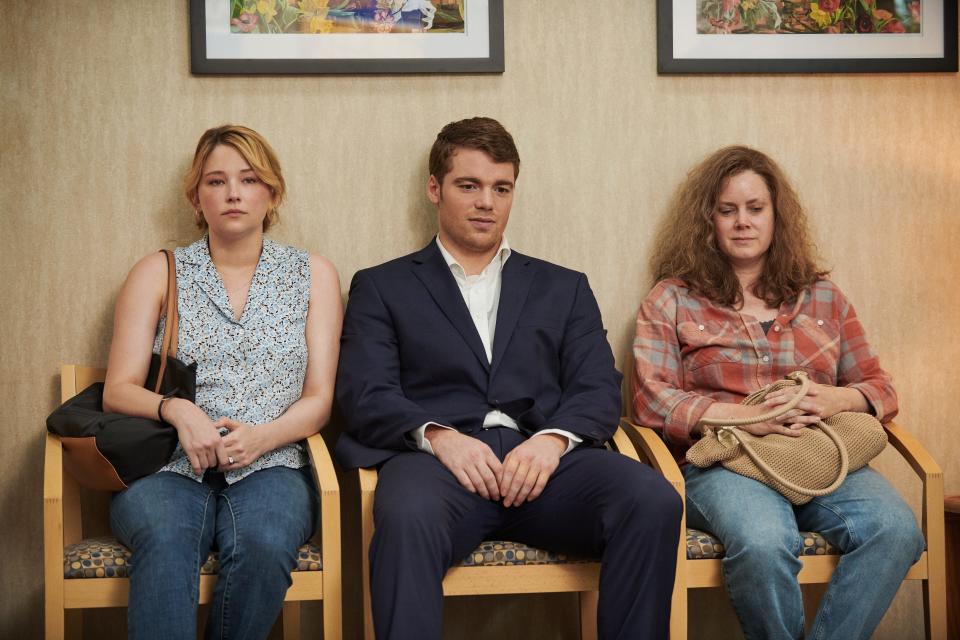Review: Glenn Close's tough-love grandma can't save Netflix's mediocre 'Hillbilly Elegy'
- Oops!Something went wrong.Please try again later.
Director Ron Howard’s “Hillbilly Elegy” is a well-acted study of a white working-class family reaching for the American dream over three generations, though its disconnected story is what’s unfortunately lamentable.
Based on J.D. Vance’s 2016 memoir about growing up in an Appalachian clan, “Elegy” (★★ out of four; rated R; streaming Tuesday on Netflix) features an acting master-clash between Glenn Close and Amy Adams as mother and daughter, plus offers a solid breakthrough for Gabriel Basso.
They can only do so much with inconsistent parallel timelines unraveling the Vance family’s various struggles, and even though a fairly unrecognizable Close is most compelling as a tough-love grandmother, the narrative suffers from an overemphasis on Adams as her abusive daughter dealing with drug addiction.
Holiday movie preview: 10 must-see new films to stream while stuck at home, from 'Hillbilly Elegy' to 'Soul'
Review: Netflix's excellent 'Citizen Kane' origin story 'Mank' isn't just for film nerds

Played by Basso, J.D. is a former Marine and current Yale Law student without the financial privilege of his peers, working three jobs to put himself through school. He aims to be a summer intern in Washington, D.C., with his girlfriend (Freida Pinto), but just before an important interview, J.D.’s sister Lindsay (Haley Bennett) calls him to come back to their rural Ohio hometown – its halcyon days of being a steel hotbed long gone – because mom Bev (Adams) is in the hospital after a heroin overdose.
J.D.’s return triggers memories of his childhood as a troubled boy (Owen Asztalos) raised by a single mom who at times tries too hard to be a good parent and at others physically and emotionally traumatizes the youngster to a "call Child Services" degree. As addiction and bad life decisions consume Bev, tough-love Mamaw (Close) takes in teen J.D. The cantankerous grandma weathers her own health and financial problems as she sets J.D. straight on a positive path, even as his mom’s self-destructive tendencies don’t do him any favors in the past or the present.

Adapted by Vanessa Taylor (“The Shape of Water”), “Hillbilly Elegy” works best when focusing on the grown-up J.D., forced to make a choice between his family and his future. The younger years tend to be a little bit more of an overdone after-school special/cautionary tale: Bev’s an unpredictable, raging hot mess, and sensitive J.D. is caught in a cycle of abuse. That’s also apparently generational, though mistreatment is only passingly glimpsed in a flashback to his mom’s youth. In fact, Mamaw’s overall backstory, which involves getting pregnant at 13 and abandoning the family’s old Kentucky home, is hinted at yet frustratingly left behind.
Howard’s usually reliable, no-frills filmmaking has mixed results juggling the main characters. It’s weighted heavily in Bev’s favor for much of the first half, chock-full of Adams usually shouting, snarking and/or snarling, so much so you begin to forget it’s supposed to be J.D.’s story. Close’s more nuanced role becomes increasingly important during Bev's downward spiral: A crusty and politically incorrect matriarch, Mamaw lets certain things fly to keep her family together (including quite a few Bev episodes), though puts down her foot when absolutely needed. Close deserves Oscar nod No. 8 for giving off a palpable, unconventional warmth.
Basso’s also strong as the older J.D. – shoutout to the casting director because he and Asztalos, J.D.'s childhood self, look uncannily alike – and lends the film a steady presence whenever on screen. Basso exudes an oafish likability alongside Pinto (one scene has him calling her when he doesn't know which forks to use at a fancy dinner) and also a sense of regional pride when he bristles at a high-class lawyer daring to use the word “rednecks.”
“Elegy” brings up but only barely touches – mainly through Mamaw's protective nature – the tight-knit nature and code of J.D.’s people from the “hill country,” a forgotten aspect that, if explored more, would have boosted the overall narrative. Without a truly distinguishing “Hillbilly” charm, it’s simply a middling dysfunctional family drama with A-list actresses.
More: 'Hillbilly Elegy' is No. 1; new Oprah pick is a best seller
This article originally appeared on USA TODAY: 'Hillbilly Elegy' review: Glenn Close shines in Netflix family drama

